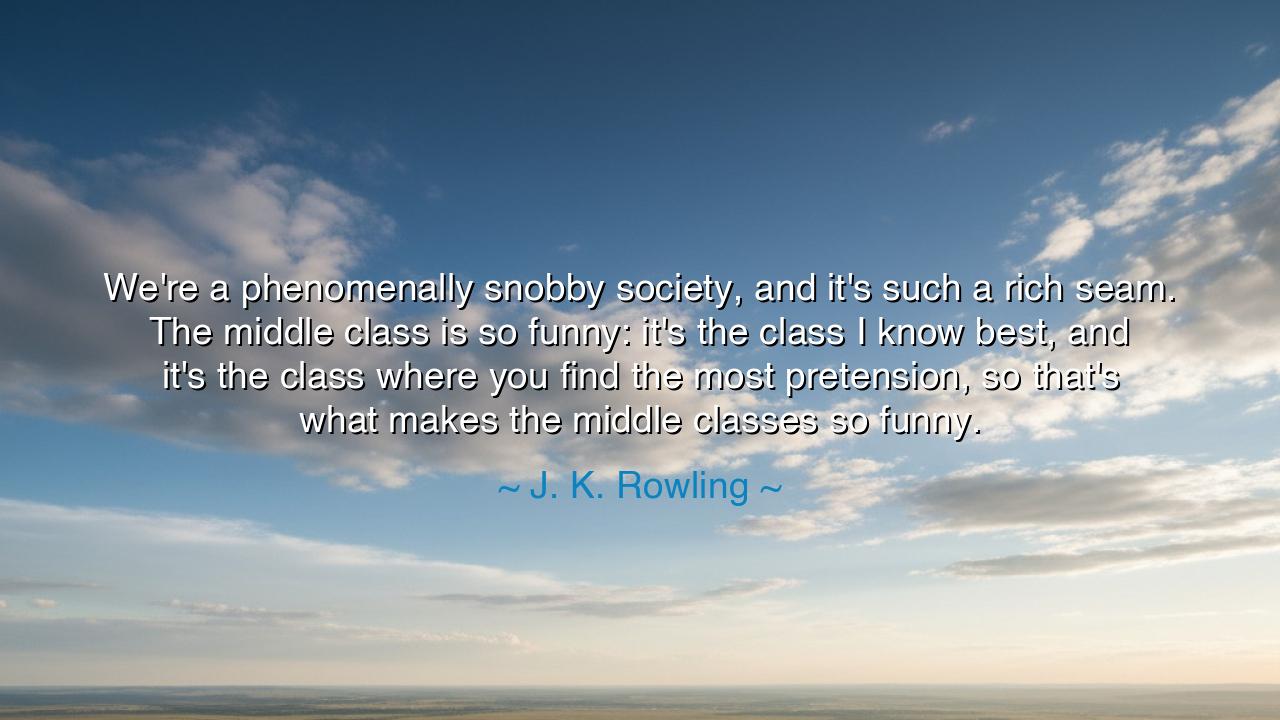
We're a phenomenally snobby society, and it's such a rich seam.
We're a phenomenally snobby society, and it's such a rich seam. The middle class is so funny: it's the class I know best, and it's the class where you find the most pretension, so that's what makes the middle classes so funny.






In the words of J. K. Rowling, “We’re a phenomenally snobby society, and it’s such a rich seam. The middle class is so funny: it’s the class I know best, and it’s the class where you find the most pretension, so that’s what makes the middle classes so funny.” — there glimmers both irony and insight, spoken by one who has looked deeply into the heart of her own people. Within her words lies a reflection not merely on society, but on the human condition itself — our yearning to belong, our hunger for dignity, and the quiet absurdity that arises when pride and insecurity dwell together. Rowling speaks as both observer and participant, finding humor in the very frailties that shape the soul of civilization.
The meaning of this quote rests on an eternal truth: that every class, every people, every tribe of humankind, is defined not by its wealth, but by its self-image — by the masks it chooses to wear. The middle class, as Rowling describes, lives in the delicate balance between aspiration and fear. It is the class that dreams of climbing, yet trembles at the thought of falling. From this tension springs pretension, that tender and ridiculous impulse to appear grander than one truly is. But in that folly lies both tragedy and comedy. For pretension, though foolish, is profoundly human — it reveals our longing to be seen, to matter, to transcend our station.
This is why Rowling calls it a rich seam — a mine of endless storytelling, for within the middle class are the contradictions of all humanity: pride and insecurity, generosity and greed, sincerity and vanity. To the wise, these contradictions are not scornful but sacred, for they show us that even in absurdity, we are striving toward meaning. The laughter she finds in the snobbery of society is not cruel laughter, but the laughter of recognition — the kind that says, “Yes, we are all this way sometimes.” It is the laughter of humility, the sound of truth clothed in mirth.
In the ancient world, the playwright Molière revealed this same truth in his comedies of manners. His Bourgeois Gentleman — a man who tries to act like a noble — was both ridiculous and relatable. Audiences laughed at his pompous speeches, his desperate imitations of refinement, yet they also saw themselves in him. For who among us has not worn the costume of confidence to hide the trembling heart beneath? Molière, like Rowling, knew that humor is not a weapon against others, but a mirror held gently to ourselves. In seeing our vanity exposed, we learn to forgive it.
The origin of Rowling’s insight, perhaps, lies in her own life’s journey. Born of modest means, she lived within and among the middle class, witnessing its striving, its fears, and its quiet comedies firsthand. Later, as fame and fortune transformed her circumstances, she did not abandon that world — she observed it from new vantage points, understanding its dreams and delusions all the more keenly. Her stories, from Harry Potter to her later works, are filled with echoes of this understanding: people who wish to appear better, purer, or more powerful than they are, and who learn, in the end, that humility is the truest nobility.
The lesson here, my friends, is twofold. First, to see humor in pretension is to be wise, for laughter turns judgment into compassion. We must not despise those who chase illusions of grandeur, for in doing so, we despise the part of ourselves that still longs to be enough. Second, we must guard against our own snobbery — not only the snobbery of wealth, but the snobbery of intellect, of morality, of taste. To believe oneself above others is to build a tower of mirrors, where one sees only one’s own reflection and mistakes it for the world.
Therefore, let us walk through society with eyes open and hearts kind. When we see the pretension of the middle class, or any class, let us smile, not sneer. Let us remember that laughter can be holy, if it humbles us toward empathy. And when we find ourselves pretending — as we all do — let us not be ashamed, but aware. Awareness is the first step to authenticity. To laugh at our own illusions is to begin to outgrow them.
So, heed the wisdom of J. K. Rowling, who teaches through wit what philosophers once taught through parable: that the world’s snobbery is not merely foolish, but revealing. It shows how desperately the human soul yearns to matter — and how comical and beautiful that yearning can be. Learn, then, to laugh with grace, to see folly without cruelty, and to stand humbly in your truth. For the world will always have its pretenders, but the wise will know that behind every mask — even the most ridiculous one — there beats a heart that only wishes to be seen.






AAdministratorAdministrator
Welcome, honored guests. Please leave a comment, we will respond soon